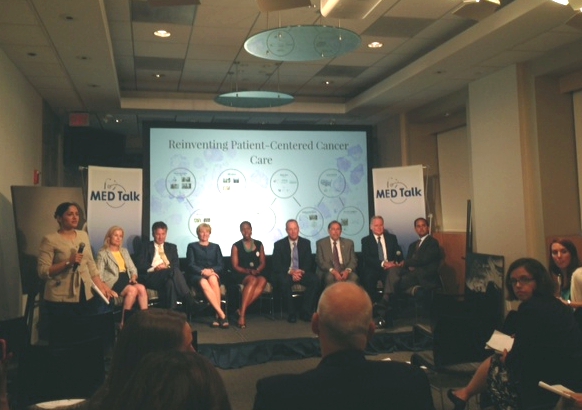Reinventing Patient-Centered Cancer Care Brookings Institute “MEDTalk”

MEDTalk: Reinventing Patient-Centered Cancer Care
On Wednesday, as part of the Merkin Series on Innovation in Care Delivery, the Brookings Institute held an event in their new MEDTalk format titled, Reinventing Patient-Centered Cancer Care. The MEDTalk event follows the popular TED Talk format, and it was designed to feature several short presentations that considered the challenges of delivering oncology care while enhancing the patient experience, improving coordination of care, and reducing costs.
To begin, Andrene Taylor, Executive Director of ZuriWorks, spoke to her experience as a three-time cancer survivor. At the age of 25, while a graduate student at Howard University, Andrene was diagnosed with Hodgkin’s lymphoma. Her entrance to the health care system was through Howard University Hospital in Washington, DC and then at City of Hope in Duarte, CA. After her cancer failed to respond to treatment, Andrene persuaded doctors at the National Institutes for Health (NIH) to include her in a clinical trial. While this treatment was not successful either, she stressed how important it was for her to participate as many African American women are not included in trials. She also noted that it was at NIH that she received the best care as a result of excellent care coordination. Ultimately, she had a stem cell transplant at the University of Maryland Medical Center and she is currently cancer free.
Through her journey in the cancer care system, Andrene had to learn how to “show up” as a patient and assert how she wanted to be treated by her health care team—elements that are the cornerstone of self-advocacy. The challenging experiences outnumbered the positive ones, and many times she was treated unfairly due to her age, gender, and race. She recounted a story of when, early in her treatment, she had to make the difficult decision to stop treatment with a provider because the doctor was not accepting of her active participation in her care. She said, “I would have rather died then let this doctor prescribe another course of treatment.” Andrene’s presentation pointedly articulated the important role of self-advocacy and how it assisted in combating a system that does not facilitate quality care.
Patrick Conway, Chief Medical Officer and Deputy Administrator for Innovation and Quality from the Centers for Medicare and Medicaid Services (CMS), provided a series of high level results from the Center for Medicare and Medicaid Innovation (CMMI or Innovation Center) models. The Innovation Center is currently focused on three priorities: testing new payment and service delivery models, evaluating results and advancing best practices, and engaging a broad range of stakeholders to develop additional models for testing. Dr. Conway delivered positive results regarding Accountable Care Organizations (ACOs), bundled payment pilot for acute care and post-acute care, and Primary Care Medical Homes (PCMH), all of which demonstrated improved quality care and cost savings. Specific to oncology, CMMI is currently working on a combination model including patient-centered oncology medical homes and bundled payments/episodes of care. As NCCS stated in comments submitted to CMMI in April 2014, we believe that this combination will trigger the standardization of processes of care while presenting a rational means of paying for a new model of care. The goals of the patient-centered oncology medical home are consistent with the attributes of a quality cancer care system typically identified by patients and patient advocates. We are hopeful that new payment models will provide incentives to medical oncologists to embrace reform to foster patient-centered care.
In addition, there were several other engaging and informative presentations that were true to the title of the event and focused on patient-centered care. Panelists discussed many innovative approaches that they are currently employing in their practices, resulting in positive outcomes for improved quality care, but unfortunately they are faced with challenges that impede on their ability to sustain and grow their practices due to the landscape of payment and delivery options. Brookings will be releasing an issue paper in the near future as a result of this event and NCCS looks forward to continuing to influence this discussion.
post by Kelsey Nepote




